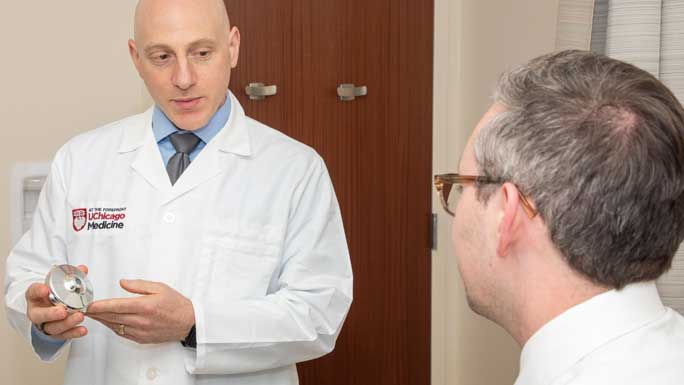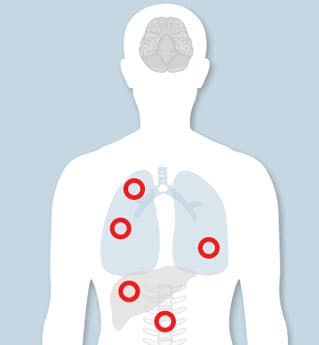Metastatic Colorectal Cancer Treatment

Learning you have metastatic, or stage 4, colorectal cancer can be distressing, but you do not have to feel hopeless or alone.
Our internationally recognized cancer experts at the UChicago Medicine Comprehensive Cancer Center are committed to helping people who have colorectal cancer that has spread to their liver, lungs or other areas of the body. Working collaboratively, our team can offer a full range of patient-centered care options, including many that are not available elsewhere.
New treatments are changing the outlook for many people with metastatic colorectal cancer, even for some who have been told their condition is untreatable.
Our colorectal cancer physicians are among the nation’s leading authorities on the latest therapies that may prolong survival and improve quality of life in patients with colorectal cancer that has spread to a limited number of sites.
The multidisciplinary team at UChicago Medicine designs personalized care plans using detailed molecular profiling of the patient’s tumor and combining cancer therapies that may not be available at most hospitals. This includes advanced radiation techniques like stereotactic body radiation therapy (SBRT) plus immunotherapy, which uses the body’s own immune system to kill cancer.
We also specialize in the latest interventional and surgical options, including ablation to destroy tumors and hyperthermic intraperitoneal chemoperfusion (HIPEC), which uses heated chemotherapy to kill cancer cells. We are also the only hospital in Illinois to offer hepatic artery infusion that delivers chemotherapy directly to tumors in the liver. In addition, we were one of the first hospitals in the nation to offer histotripsy, a breakthrough noninvasive procedure that uses sound waves to destroy tumors that have spread to the liver.
For select patients with liver-only disease, we also offer living donor liver transplants.
Our physicians are also leading research to discover even better ways to help patients with metastatic colorectal cancer live longer and with less pain and fewer side effects from treatment.
UChicago Medicine physician-scientists conducted groundbreaking research into new methods to predict which patients with metastatic colorectal cancer are more likely to have a favorable treatment outcome after removal of liver metastases.
Frequently Asked Questions About Metastatic Colorectal Cancer
Colorectal cancer most often spreads to the following sites:
- Liver
- Lungs
- Lining of the abdominal cavity (peritoneum)
- Lymph nodes
Symptoms of metastatic colorectal cancer depend on where the cancer has spread. When colorectal cancer has spread to the liver, it may cause symptoms such as:
- Pain on the right side of the abdomen that may get worse with deep breaths
- Unexplained weight loss
- Yellow skin and eyes (jaundice)
- Fatigue out of the ordinary
- Blood in the stools
- Low red blood cell counts (anemia)
When colorectal cancer spreads to the lungs, it may cause:
- Shortness of breath
- Frequent respiratory infections
- Coughing
- Chest pain
However, some people with metastatic colorectal cancer may not have any of these symptoms. That is why it’s important to have an experienced team monitor your health.
“Oligometastatic” is another way of saying that colorectal cancer has spread to a limited number of sites in the body. The number varies, but typically this means a person has five or fewer metastases (tumors that have spread).
At UChicago Medicine, our Limited Metastatic Cancer Program specializes in helping people with oligometastatic colorectal cancer and other stage 4 cancers live longer lives. Even if you were told you are not a candidate for aggressive treatment elsewhere, you may benefit from therapies we offer. This includes immuno-oncology treatments, advanced radiation and interventional oncology therapies and surgical options that are not widely available.
Our researchers are also leading studies to determine which patients with liver metastases are most likely to benefit from aggressive treatment, based on the specific makeup of their tumors.
Our cancer team can order different types of tests to make a diagnosis. We will also determine the stage of cancer based on the extent and size of the tumors. This is important to plan the best course of treatment.
Some of the tools used to diagnose and stage colorectal cancer include:
- Blood tests
- Biopsies to remove and examine small tissue samples
- Advanced imaging tests, including:
- Computed tomography (CT) scans, which use low-energy X-rays to produce 3D images of tissues and organs
- Magnetic resonance imaging (MRI), which uses a strong magnet to produce detailed pictures of organs and other parts of the anatomy
- Positron emission tomography (PET) scans, which use a radioactive substance to uncover cancer cells in the body
When you come to the UChicago Medicine Comprehensive Cancer Center, our team of medical oncologists, radiation oncologists, interventional radiologists, surgical oncologists, pathologists, radiologists, nurses and other experts will work together to determine the best treatment plan for you. This plan depends on several factors, including:
- Your specific type of colorectal cancer based on detailed molecular profiling of your tumor
- The number and size of tumors that have spread to other parts of your body
- Your personal goals and preferences
- Your overall health
Surgical Options for Metastatic Colorectal Cancer
Our surgeons offer several procedures for metastatic colorectal cancer that are not widely available. Some of these options include:
For patients with colorectal cancer that has spread to the liver, a hepatic artery infusion pump delivers chemotherapy directly to the liver through a surgically implanted pump. The dose of chemotherapy is 300 to 400 times greater than regular chemotherapy, without any of the side effects. UChicago Medicine is one of only a select number of hospitals in the country to offer this procedure.
Hepatic Artery Infusion (HAI) Pump Chemotherapy for Liver Metastases
The hepatic artery infusion pump is a wireless metal pump that is placed inside the abdominal wall during a surgical procedure. The device is about the size of a hockey puck. The pump is connected to the liver via a small tube placed into a blood vessel connected to the hepatic artery.
The HAI device pumps high doses of chemotherapy directly into the liver-- as much as 300 to 400 times higher than intravenous chemotherapy. The high doses of medication remain in the liver as opposed to circulating through the body as in traditional therapy.
Over time, tumors shrink or disappear. For patients who are not yet candidates for surgery to remove tumors, HAI can shrink tumors so they can be removed with surgery. For patients who have had liver tumors removed, HAI can reduce the risk of tumor recurrence.
The UChicago Medicine Comprehensive Cancer Center is one of a select number of hospitals in the nation that offers this advanced treatment. We're also leaders in hepatic artery infusion research, and are actively conducting clinical trials, with the goal of making HAI available to more patients who may benefit.
Learn more about hepatic artery infusion and request an appointment at UChicagoMedicine.org/hai.
Drug Therapy for Metastatic Colorectal Cancer
We may recommend one or more drug therapies in combination with other treatments, such as surgery or radiation, to treat metastatic colorectal cancer. Drug therapies include:
This type of treatment helps the body’s immune system fight cancer. Our cancer experts are considered international leaders in using immunotherapy against cancer and have been studying these treatments for more than three decades. Some examples of immunotherapy include:
- Vaccines: Our physician-researchers are currently testing how to use individualized vaccines based on the makeup of each patient’s cancer, combined with chemotherapy.
- CAR T-cell therapy: This innovative treatment helps doctors supercharge the immune system to target cancers. UChicago Medicine is leading clinical trials on CAR T-cell therapy for patients with metastatic colorectal cancer and other solid tumors.
Radiation Therapy for Metastatic Colorectal Cancer
Our radiation oncologists are working with medical oncologists to test new approaches of using radiation therapy to “burst open” cancer cells in tumors and prime the immune system before immunotherapy for patients with limited metastatic colorectal cancer. Our cancer specialists may also suggest aggressive treatment plans combining advanced radiation techniques with chemotherapy or surgery.
We offer a full range of radiation therapy treatments, some of which are not widely available. This includes:
Interventional Oncology Therapies for Metastatic Colorectal Cancer
UChicago Medicine is a leader in this emerging field of oncology, which uses image-guided, minimally invasive procedures to treat cancer. We are one of only a few hospitals in Chicago to offer a dedicated interventional oncology clinic where patients with cancer can meet with interventional radiologists specializing in cancer treatment to discuss their options.
For patients with metastatic colorectal cancer in the liver, these therapies may include:
This is a range of minimally invasive procedures performed with small needles inserted through the skin that kill cancer cells in different ways. Some types used for metastatic colorectal tumors include:
- Microwave ablation (MWA), which uses heat to burn away cancer cells in a tumor
- Irreversible electroporation (IRE), a treatment that uses electricity to destroy a tumor and is only available at leading hospitals like UChicago Medicine
- Cryoablation, in which tumors are frozen
UChicago Medicine is one of the first medical centers in the nation to offer histotripsy for liver tumor treatment. As early adopters, our doctors have deep expertise with the procedure, allowing them to deliver the highest level of care.
Supportive Care for Metastatic Colorectal Cancer
We understand how metastatic colorectal cancer can affect so many aspects of your life — from what you eat to how well you sleep. Our supportive oncology program can offer solutions to help you and your family cope with the challenges of living with the disease. Some of the support we provide includes:
- Help managing diarrhea and other digestive symptoms
- Nutrition assessments and counseling
- Pain control
- Rehabilitation
- Genetic counseling
- Stress managementAssistance with insurance issues and financial counseling
Advanced Metastatic Colorectal Cancer Treatment Options
If your colorectal cancer is advanced, we may be able to help. Our team can suggest treatments that may help extend and improve the quality of your life. Drug therapy can reduce the size of tumors and help prevent them from spreading. An interventional oncology treatment like cryoablation may help shrink painful bone metastases and reduce symptoms. We can suggest options to address your concerns and preferences, and tailor your treatment plan to your needs.
What can I expect when I come to UChicago Medicine for metastatic colorectal cancer treatment?
You can expect advanced, thoughtful and patient-focused care. Our highly regarded metastatic colorectal cancer specialists work together to determine the best approach to treat your disease. This collaborative approach benefits you as pursuing some treatments may limit your ability to have others, at least in the short term. For example, having surgery to remove tumors usually requires taking a break from systemic chemotherapy for a few months before the procedure.
We also take time to explain what you can expect from your treatment because we believe that education is part of our mission. Our goal is to help you and your family feel more in control of your care plan.
Because UChicago Medicine is an academic medical center, our physician-scientists are actively researching new ways to treat metastatic colorectal cancer. Through our clinical trials, we offer patients with stage 4 colorectal cancer access to innovative treatments that are not available at most hospitals. Request an appointment to connect with our specialists and begin your evaluation.

High Performing in Colon Cancer Surgery
According to U.S. News & World Report's 2025-26 Rankings.
Learn more about U.S. News Best Hospitals
Treating Metastatic Cancer with Optimism and Hope
If you have been diagnosed with metastatic cancer, more therapies may be available to you than you think. Our cancer specialists are eager to help you understand all of your options.
Limited Metastatic Cancer ProgramHepatic Artery Infusion (HAI) Pump Chemotherapy for Liver Metastases
The hepatic artery infusion pump is a wireless metal pump that is placed inside the abdominal wall during a surgical procedure. The device is about the size of a hockey puck. The pump is connected to the liver via a small tube placed into a blood vessel connected to the hepatic artery.
The HAI device pumps high doses of chemotherapy directly into the liver-- as much as 300 to 400 times higher than intravenous chemotherapy. The high doses of medication remain in the liver as opposed to circulating through the body as in traditional therapy.
Over time, tumors shrink or disappear. For patients who are not yet candidates for surgery to remove tumors, HAI can shrink tumors so they can be removed with surgery. For patients who have had liver tumors removed, HAI can reduce the risk of tumor recurrence.
The UChicago Medicine Comprehensive Cancer Center is one of a select number of hospitals in the nation that offers this advanced treatment. We're also leaders in hepatic artery infusion research, and are actively conducting clinical trials, with the goal of making HAI available to more patients who may benefit.
Learn more about hepatic artery infusion and request an appointment at UChicagoMedicine.org/hai.
Request an Appointment for Cancer Care
We are currently experiencing a high volume of inquiries, leading to delayed response times. For faster assistance, please call 1-855-702-8222 to schedule your appointment.
If you have symptoms of an urgent nature, please call your doctor or go to the emergency room immediately.
To refer a patient for cancer care, please call UCM Physician Connect at 1-800-824-2282.
* Indicates required field
